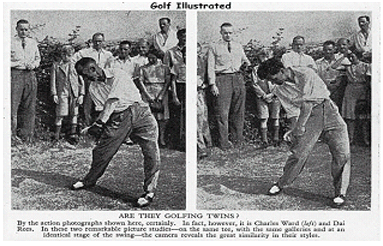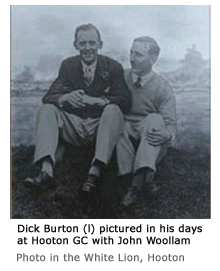|
|
|
German prisoners of war had been put to work on bringing St Andrews
back to championship standard, but Snead was unimpressed. When he
caught his first sight of the Old Course from the train, he
remarked, “Say, that looks like an old abandoned course out there”,
which did not endear him to the locals. He had little regard for the
traditions of the Open Championship, which he dismissed as “just
another tournament” and the austerity of post war Britain was, in
his words, like “camping out”. The £150 prize money was a fraction
of that on offer in the USA at that time. (In 1946 the winners of
the US Open and the Masters received $1500 and $2500 respectively
and Americans came nowhere near to covering their expenses, unless
they had a few lucrative exhibitions). Snead did not return to
defend the title and was not to play in the event again until 1962.
 Charlie Ward holed-in-one at the 8th, on his way to a share of
fourth place with Norman von Nida, Henry Cotton and Dai Rees. Rees
had broken the course record with a 67 in round two and was level
with Snead with a round to go. On the first tee of the final round
he suffered from one of those idiotic ‘supporters’ who feel it
necessary to shout on the golf course. The bellowed “Good old Wales”
came at the top of his backswing, causing a horrible slice. He then
found the Swilken Burn and the result was a disastrous seven; he
could not recover – returning an 80 against Snead’s 75. Dai would
come close on a number of occasions but the title always eluded him.
Charlie also performed consistently well in post-war Opens and was
never worse than sixth for the remainder of the forties. He and Dai
followed in the footsteps of Henry Cotton and went across the
Atlantic that year to play a few tournaments and it was the lessons
he learnt from the Americans that made Charlie one of our greatest
short game exponents. They received wonderful hospitality, staying
with the ‘Silver Scot’ - Tommy Armour, who gave them each a set of
new clubs, and playing with Bob Hope and Bing Crosby. They did quite
well and a whip-round by American friends enabled them to extend
their trip, but they outstayed their welcome from the US government
when their visas ran out. Fortunately a lenient view was taken and
they escaped with a warning: “Get on the plane or you might end up
in the U. S. Army”. Charlie Ward holed-in-one at the 8th, on his way to a share of
fourth place with Norman von Nida, Henry Cotton and Dai Rees. Rees
had broken the course record with a 67 in round two and was level
with Snead with a round to go. On the first tee of the final round
he suffered from one of those idiotic ‘supporters’ who feel it
necessary to shout on the golf course. The bellowed “Good old Wales”
came at the top of his backswing, causing a horrible slice. He then
found the Swilken Burn and the result was a disastrous seven; he
could not recover – returning an 80 against Snead’s 75. Dai would
come close on a number of occasions but the title always eluded him.
Charlie also performed consistently well in post-war Opens and was
never worse than sixth for the remainder of the forties. He and Dai
followed in the footsteps of Henry Cotton and went across the
Atlantic that year to play a few tournaments and it was the lessons
he learnt from the Americans that made Charlie one of our greatest
short game exponents. They received wonderful hospitality, staying
with the ‘Silver Scot’ - Tommy Armour, who gave them each a set of
new clubs, and playing with Bob Hope and Bing Crosby. They did quite
well and a whip-round by American friends enabled them to extend
their trip, but they outstayed their welcome from the US government
when their visas ran out. Fortunately a lenient view was taken and
they escaped with a warning: “Get on the plane or you might end up
in the U. S. Army”. The defending champion had received little more than the £100 prize money from his 1939 victory and the honour of captaining the PGA, which accompanied the title in those days (for members of the Association). The exhibitions and equipment endorsements he could have expected had been a casualty of the war. Typically Dick was philosophical about his bad luck, saying to reporters: “Me? Unlucky? I came through the war didn’t I? That’s a lot better than many did who were at St Andrews the day I won”. He had held the trophy for the longest period in its history and he arrived on the first tee having waited seven years to defend his title – he sliced out of bounds onto the beach! His partner, the 1935 champion Alf Perry, knocked it straight left and almost went out of bounds across the  vast acres of the 18th fairway, a seemingly impossible feat since
achieved by the1991 champion Ian Baker-Finch. The first tee at St
Andrews can be a daunting place at any time and, when the pressure
gets to a player, no fairway is too wide. Undeterred by his
disastrous start Dick Burton finished with threes at 17 & 18 for a
very creditable 74 and went on to finish12th. vast acres of the 18th fairway, a seemingly impossible feat since
achieved by the1991 champion Ian Baker-Finch. The first tee at St
Andrews can be a daunting place at any time and, when the pressure
gets to a player, no fairway is too wide. Undeterred by his
disastrous start Dick Burton finished with threes at 17 & 18 for a
very creditable 74 and went on to finish12th.Dick was a great character - when he was at Hooton he would play the members with just two clubs. In pre-war days he had often driven Jimmy Adams, Bill Davies and me to tournaments, before he moved to Sale, but we had to keep him talking. He was prone to nodding off and we had to make sure he stayed awake. He would sleep in the car when he was too tired to make it back home and after one tournament he was driving home alone when he felt drowsy and pulled off the road. He was awakened at 5 am by a knock on the window and was surprised to see his local bobby looking in at him. “Don’t you think you’d be better off in your bed Dick?”, said the constable. He was only a few hundred yards from home.
|
